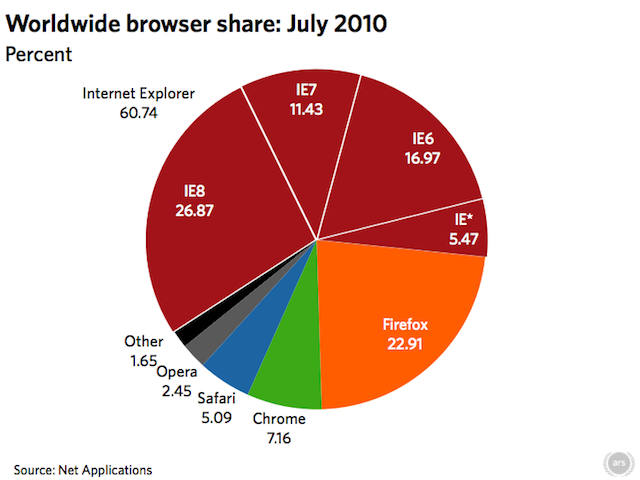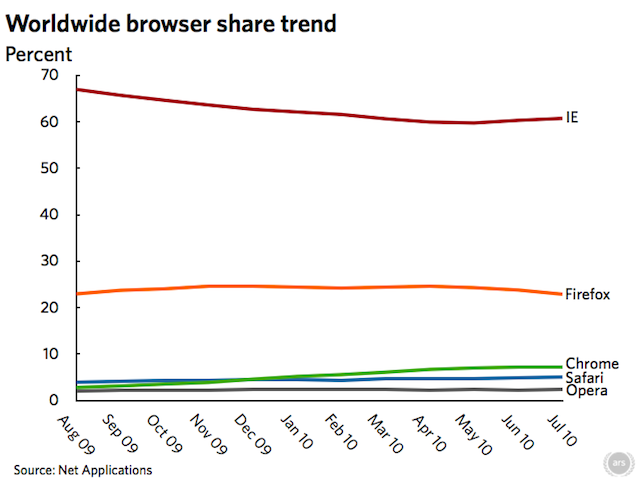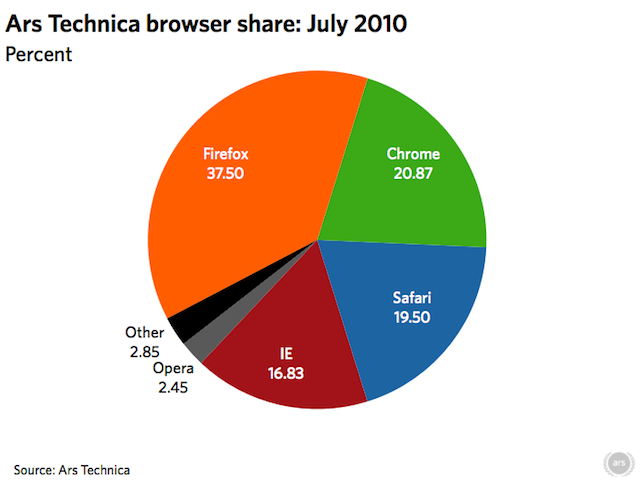
Now that we're past the halfway point of 2010, it's starting to become apparent that the browser trends we've noted over the past several months are no longer holding. Sure, Safari and Opera are still slowly gaining share, but the three big guys are restless. Firefox has started declining, Chrome's growth spurt seems to have been put on hold, and Internet Explorer experienced gains for the second month in a row.
Between June and July, Internet Explorer gained 0.42 percent (from 60.32 percent to 60.74 percent), smaller than June's gain, but still noteworthy. Firefox, meanwhile, dropped nearly a full percent (from 23.81 percent to 22.91 percent) and Chrome dipped 0.08 percent (from 7.24 percent to 7.16 percent). Safari increased 0.24 percent (from 4.85 percent to 5.09 percent) and Opera moved up 0.18 percent (from 2.27 percent to 2.45 percent).
Last month, we told you that we've seen IE drop more than one percentage point on multiple occasions, but there were anomalies where IE gained share once in a while. Still, for years it was unheard of to have IE gain share two months in a row. Now that both June and July were positive months for Microsoft, we're wondering if IE's long decline has really started to reverse, and whether we'll see IE below the 60 percent mark again. A lot will depend on how well the IE9 beta is received in September.
Microsoft continues to insist that IE's apparent progress is the result of a marketing campaign (see YouTube for The Dot-Cons) that it launched earlier last month to underline how IE8 helps stop online criminals from stealing your information. Since launch, Redmond has had many campaigns to promote IE8's various features, especially the security ones, and version 8 continues to be the fastest growing browser.
The importance of being the default browser in the world's most popular operating system continues to boost IE. Browsers from Microsoft are being used by more than 6 out of 10 people and IE8 is being used by more than one in four on the Web (quickly closing in on one in three), while IE7 and IE6 are both slowly sliding backwards in share. Although IE8's success up until June was not enough to counter the overall decline of IE, it looks like IE8's gains are now more than offsetting IE7's and IE6's declines.
Specifically, IE8 is now at 26.87 percent (and over 30 percent with Compatibility Mode), IE7 is at 11.43 percent, and IE6 is at 16.97 percent. This equates to a gain of 1.03 percent, compared to a loss of 0.36 percent plus a loss of 0.20 percent, respectively. Unfortunately for Web developers everywhere, IE6's share continues to be greater than IE7's and is declining more slowly. IE6's share can be attributed to businesses still using customized intranet applications, as well as the fact that XP's share is much bigger than Vista's.

If we take a look at the last 12 months, we can see that IE is trying to make a comeback, but it still has a long way to go. The same cannot be said for Firefox; once again it has moved away from the 25 percent mark, now dropping below 23 percent. It looks like it has lost everything it gained in the last year, and is actually lower than it was in August 2009. Chrome's progress is very noticeable in this chart, though at this point it looks like it has settled at the 7 percent mark. Safari has gained just over 1 percentage point in the year, and Opera has gained less than half of that.

As always, things at Ars are very different: Firefox continues to dominate, but this month we saw Chrome steal back second place, pushing Safari into third while Internet Explorer remained in fourth place. Compared to last month, Firefox gained share, as did Chrome and IE. Safari was the only one of the major browsers to lose share.
reader comments
86